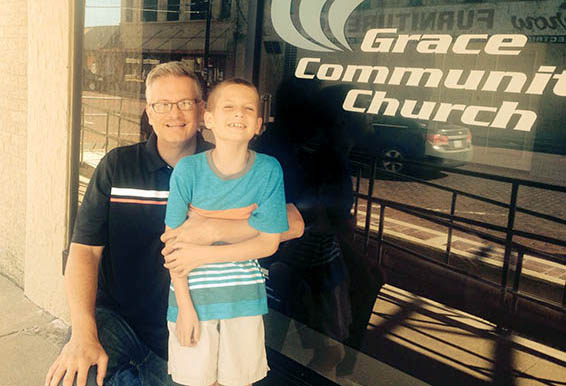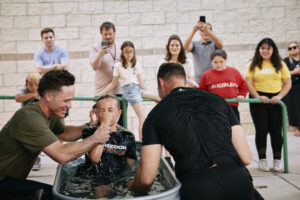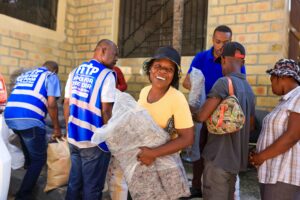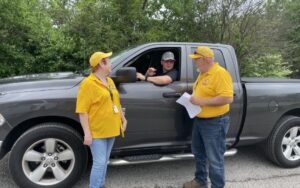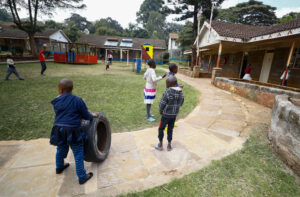
CORSICANA, Texas (BP) — Dealing with autism has been a daily challenge for Steve and Kim Hayes since the birth of the couple’s third son, Pierce, now 11. It’s a challenge that has also been embraced by Corsicana’s Grace Community, the steadily growing church of 250 that Steve has pastored for six years.
“Before Pierce turned 2, we started to have concerns about his development. He was late on just about everything: speaking, crawling, walking,” Steve Hayes, a Criswell College graduate who lives with his family in Corsicana, Texas, recalled. And yet, Pierce seemed happy.
“In many ways he was our easiest child,” Hayes said. “We didn’t know [until] later that this was mainly because he was in his own little world.”
A doctor delivered the diagnosis of autism when Pierce was 2 years old.
“Socialization for autistic children does not happen naturally as it does with other kids,” Hayes said. “Developmentally, they fall behind because socialization pushes us to develop in a lot of ways. Pierce does not have that wiring.”
Steve and Kim researched options, finally settling on a behavioral modification program called Applied Behavioral Analysis offered at Plano’s Wayman Center.
“We wanted to be able to do a therapy we could track and monitor. It was a perfect fit for us,” Hayes said.
It was also an expensive fit, at the time not covered by the family’s health insurance.
Friends, family and supporters provided funds to help Steve and Kim pay for the school for five years. One gentleman unexpectedly financed half a year of Pierce’s therapy.
“It was a blessing to have a network of people partner with us. It was humbling. But it made us think of countless families who don’t have that option,” Hayes said.
As a fifth grader in a Corsicana public school, Pierce has his own aide who stays with him all day. “Because we caught his condition early and got him into such intensive therapy, today his behavior is manageable,” Hayes said.
Pierce’s behavior is manageable but still presents challenges in social settings, including church.
“Pierce has severe communication deficits, so he cannot sit and have a conversation with you. He has a vast vocabulary and he is very good with numbers and letters. He still does not talk much. He can only string together two- or three-word phrases,” said Hayes, describing his son’s behavior.
“With a kid like Pierce, everywhere you go, you get used to being a spectacle because he will make crazy noises or engage in odd behaviors. You get looks and comments; it’s part of the deal.”
Attending church at all can be difficult for families with special needs children.
“Families of special-needs children often do not feel welcome at church,” Hayes said. “They feel like there’s nobody there who can help them with their child and going to church will be difficult, maybe even embarrassing and definitely disruptive.”
Hayes and Grace Community want to change that.
Ministry to families with special needs starts with transparency from the pulpit at Grace Community, Hayes says.
“I talk a whole lot about our situation with Pierce from the pulpit. I don’t hide it,” said Hayes, who noted that churches should find ways to acknowledge the issues of special needs. “I talk about how difficult it is and how enriching it can be to raise a kid like this.”
At times, Hayes has been in the middle of a sermon when Pierce made a run for the stage, once joining the worship team. “I can play it off with a comment like, ‘Boy, you’ve really got to watch out for those pastor’s kids’ and people laugh. Our church has become very comfortable with it. But if I didn’t have that platform, it would be difficult,” Hayes acknowledged.
Autism will increasingly impact the church, he said.
In fact, autism spectrum disorder (ASD) affects one in 88 people, according to a 2012 study cited by the National Institute of Neurological Disorders and Stroke.
In addition to transparency from the pulpit, a welcoming atmosphere can help make families with special-needs children feel at home, Hayes says. Active involvement in the lives of families with special needs can also help.
A sympathetic elder noticed the difficulty Hayes’ wife Kim was having even getting to church with the family’s five kids in tow. The elder set up a rotation of volunteers to sit with Pierce during services, giving Kim an opportunity to worship without distraction.
“We offered training where we introduced Pierce, who he is, what kinds of behaviors to expect and what to do,” Hayes said.
Speech therapists, occupational therapists and special education teachers can be helpful resources for teaching others how to deal with special-needs kids.
“Don’t be afraid to go there with a family. Don’t keep your distance,” Hayes urged.
Churches with more resources often develop teams of people to assist with special-needs members, noted Hayes, who cited the Sunshine Pals program at Irving Bible Church, where adults volunteer as aides for special-needs children in Sunday School and other events to help them participate.
Grace Community has six families with special needs, ranging from severe to milder autism to cerebral palsy. Although isolation can be less disruptive, children with special needs can benefit from inclusion in typical activities.
“The best thing for these kids is to socialize them, to put them in typical environments and to teach them how to appropriately respond in social environments. This can be very messy. It is easier to isolate them but better for them to socialize,” Hayes said.
Grace Community is also working with students from nearby Navarro College to prepare a sensory room filled with kinesthetic items where special-needs kids can go when they are having a hard time functioning at a church event or service. The room will include items like bowls of rice, which Pierce loves to run his fingers through. Special hammock swings and small digital objects that make noises will also be in the room.
“We must be ready to minister to an increasing segment of people who need their spiritual needs met but are torn by the idea of even being able to come to church,” Hayes said.
“In Scripture, God calls us a peculiar people, strangers and aliens in this world. Believers must develop sensitivity to others in this world dealing with a strangeness, oddity or differences. We are peculiar people called to minister to peculiar people. We are different and odd to the Lord but he still showers us with his grace.”
–30–
Jane Rodgers is a correspondent for the Southern Baptist TEXAN, newsjournal of the Southern Baptists of Texas Convention, where this article first appeared. Get Baptist Press headlines and breaking news on Twitter (@BaptistPress), Facebook (Facebook.com/BaptistPress) and in your email (baptistpress.com/SubscribeBP.asp).
